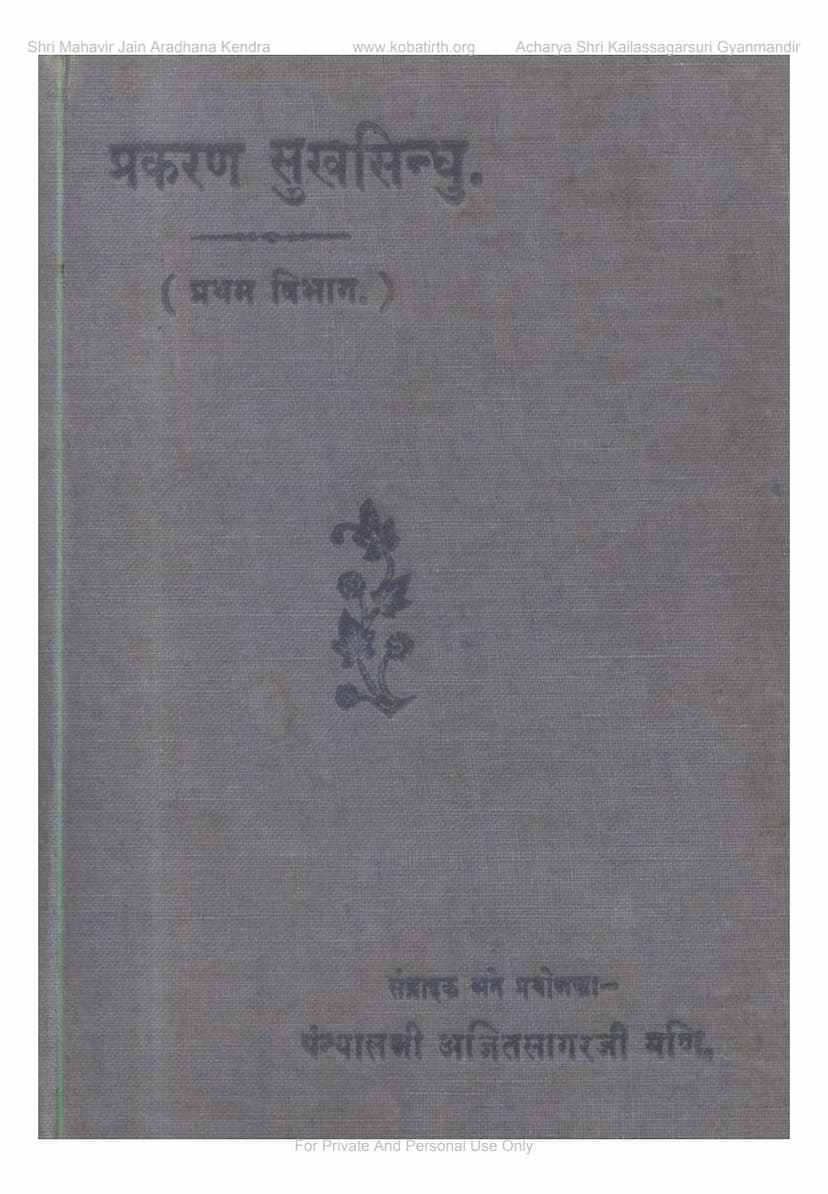Prakarana Sukhsindhu Part 1
Added to library: September 2, 2025

Summary
This is a comprehensive summary of the Jain text "Prakarana Sukhsindhu Part 1" by Acharya Ajitsagarsuri, based on the provided pages:
Overview of the Book:
-
Title: Prakarana Sukhsindhu (समुद्र) Part 1 (प्रकरण सुखसिन्धु. प्रथम विभाग)
-
Author: Panyas Sri Ajitsagarsuri (प. १. प. श्री अजितसागजी मणी), also referred to as Panyas Ajitsagarji Gani (प. श्र. अजितसागरजी गण).
-
Publisher: Vitthalbhai Jivabhai Patel, Ahmedabad (प्रकाशक: विठ्ठलभाई जीवाभाई पटेल, झवेरीवाड़, नागोरीराह-અમદાવાદ).
-
Publication Year: 1920 AD / 2447 Veer Samvat.
-
Purpose: The book aims to compile and present valuable Jain texts, particularly "Prakarana" or "Shataka" (collections of verses or chapters), in a way that is accessible and beneficial to the Jain community, including monks, nuns, laymen, and laywomen. The author, Panyas Ajitsagarji, has provided Sanskrit explanations and Gujarati translations for each verse.
-
Content Structure: Part 1 of this work contains six distinct "Prakarana" or "Shataka" texts:
- Vairagya Shatak (वैराग्यशतक): Focuses on detachment from worldly pleasures and the impermanent nature of material possessions, youth, wealth, and relationships. It emphasizes the futility of attachment to fleeting things and the pursuit of eternal happiness.
- Indriya Parajay Shatak (इंद्रियपराजयशतक): Deals with the conquest of the senses. It highlights how worldly objects are temporary and often lead to sorrow, advocating for detachment from sensory pleasures. It suggests that true victory lies in controlling the senses, even if it requires forceful renunciation initially.
- Sambodh Sattari (संबोध सत्तरि): This collection of seventy verses (Sattari) offers profound wisdom and guidance. A key teaching is that spiritual liberation is attainable regardless of sect (Svetambara, Digambara, Buddhist, or others) if one cultivates equanimity and focuses on the inner self. It stresses the importance of recognizing the inherent equality of souls, transcending physical appearances, emotions, and thoughts. The text also underscores the critical role of right faith (Samyaktva) in spiritual progress, stating that one without it cannot achieve liberation.
- Chau Sharan Payanno (चउशरण पयन्नो): This text focuses on the concept of "four refuges" (Arhant, Siddha, Sadhu, and the Dharma prescribed by Kevali). It emphasizes that true refuge is found in these during life, not just at the time of death, and one must have faith and follow their teachings throughout their life.
- Aaur Pacchakhan Payanno (आउर पच्चक्खाण पयन्नो): This section describes the vows or renunciations (Pacchakhan) that a sick or ailing person should undertake. It also details the different states of beings during death – immature, learned, and wise – and the resulting conditions. The text implies that preparation for death should be made earlier in life, as attempting significant renunciations at the moment of death is difficult.
- Shri Karpur Prakaran (श्री कर्पूर प्रकरण): This final section of Part 1 contains excellent Sanskrit verses on various important topics related to Jainism, such as austerities (Pashadh), monks (Sadhu), vows (Shil), penance (Tap), wisdom (Bodha), laymen (Shravak), laywomen (Shrravika), and knowledge (Gyan). The author stresses the importance of understanding the meaning of these verses for true benefit.
-
Financial Support: The publication was made possible by the financial assistance of esteemed individuals, including Seth Uttambhai Harichand Parekh of Mehsana and other philanthropists. The publisher notes that the book is being offered at a nominal price, less than its production cost, with the proceeds intended for further charitable work.
Key Themes and Teachings:
- Impermanence of the Worldly: A recurring theme is the transient nature of worldly pleasures, possessions, youth, and even relationships. The text repeatedly emphasizes that these are fleeting and ultimately lead to sorrow.
- Detachment and Renunciation (Vairagya): The book strongly advocates for detachment from worldly attractions and sensory pleasures, encouraging readers to seek lasting happiness in spiritual pursuits.
- Control of the Senses (Indriya Jaya): The text stresses the importance of mastering the senses, suggesting that unchecked senses lead to suffering and hinder spiritual progress. It advocates for deliberate practice and control over sensory desires.
- The Power of Right Faith (Samyaktva): The "Sambodh Sattari" section highlights that true faith in Jain principles is paramount for liberation, irrespective of external sect affiliations.
- The Significance of Dharma Throughout Life: The "Chau Sharan Payanno" emphasizes that the practice of Dharma and seeking refuge in the four refuges must be a lifelong commitment, not just a deathbed resolution.
- Consequences of Actions: The texts implicitly and explicitly discuss the karmic consequences of actions, stressing that individuals experience the results of their own deeds.
- The Importance of Wisdom and Understanding: The author emphasizes that mere recitation of verses is insufficient; true benefit comes from understanding and internalizing the meanings and acting accordingly.
- The Role of a Guru: The text highlights the importance of following the teachings of enlightened gurus and the dangers of associating with "bad gurus" (Kaguru).
- The Value of Essential Jain Practices: The book covers core Jain practices like vows, austerities, meditation, and the importance of the Jain path for achieving ultimate happiness.
Overall Message:
"Prakarana Sukhsindhu Part 1" serves as a guide for spiritual upliftment within the Jain tradition. It aims to instill in its readers a sense of detachment from the material world, a strong resolve to control their senses, and a deep understanding of Jain philosophy, all of which are presented as essential steps towards achieving liberation and eternal bliss. The author's efforts in translating and explaining these profound texts are intended to make them accessible and impactful for contemporary Jains.